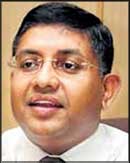Budget benefits for SMEs, agri sector
From the Business Desk
The business community and the public sector hailed the 2012 budget
proposals presented by President and Finance and Planning Minister
Mahinda Rajapaksa. They that it was a development oriented budget which
will take the country towards being the Wonder of Asia. The key economic
driver of the economy, the Small and Medium sector received a major
boost from the budget with a bundle of incentives while similarly the
agriculture sector too received concessions. Proposals were also
presented to woo more foreign direct investments by way tax holidays.

Kishu Gomes |

W.K.H. Wegapitiya |

Janaka Ratnayake |

Asoka Hettigoda |

Rohantha Athukorala |

Anura Lokuhetti |
The public sector welcomed the 10 percent increase to their basic
salary which is fulfilling yet another pledge under the Mahinda
Chintanaya.
Laugfs Holdings Chairman W.K.H. Wegapitiya said the measures taken to
strengthen the SME sector is timely as most of the developed countries
have achieved growth through SME led economies. “The SME sectors of
these countries have contributed 80 percent growth of the overall GDP
and Sri Lanka could take a cue from them,” he said.
The action to extend tax concessions under the BOI regime will lead
to a high inflow of foreign investment while facilitating more business
volumes. The special emphasis given to encourage the research and
development process is timely and this will have far reaching benefits
in the growth and development of the SME sector.
Export Development Board Chairman Janaka Ratnayake said the
devaluation of the Rupee by three percent is an encouragement given to
local exporters and they have been waiting for this move to generate
more revenue and maintain the competitive edge over other countries.
This devaluation will also slow down import growth and demand which in
turn will be favourable towards the trade balance.
The exporters will be able to reach targets set as improved volume
growth in exports could be witnessed over time. The many concessions
granted under the budget which also augurs well for the export sector in
the long run by way of tax holidays and incentives. Overall the
budgetary measures will provide a positive outlook for the country’s
export sector despite adverse global economic conditions.
National Chamber of Commerce Chairman Asoka Hettigoda said there are
some key areas focusing on the 2012 budget. Those are development of the
SME sector, promotion of new technologies, reducing the imports, focus
on new areas of investment such as healthcare, education, tourism,
sports, cement, steel, pharmaceutics, fabric , milk powder manufactured
in Sri Lanka will be entitled to a 12 percent income tax rate for
existing companies and a five years tax holding for new companies.
Further Research and Development companies will pay a reduced rate of
20 percent.
The healthcare service will pay only 12 percent. “Those are the key
sectors that can help our economy grow,” he said.
Economist and marketer Rohantha Athukorala said: “The range of tax
concessions that will be given to those who invest in new companies in
Sri Lanka on the money earned overseas is a positive budget proposal.
But we must make industry policy decisions post a private-public
partnership (PPP) process. If not this all important proposals will not
become a reality at implementation stage. A point to note is that the
private sector has Rs 168 billion as cash at banks as at end March 2011
that has the potential to be invested in Sri Lanka too.
The tourism sector which is making great strides with the
establishment of permanent peace fulfilled one of their biggest demands
by receiving concessions for tourist bus imports.
Caltex Lubricants Managing Director Kishu Gomes said the government
made very good decisions in last year’s budget and this year’s budget
has reinforced and strengthened the same rather than introducing new
items which is good enough.
He said the devaluation of the Rupee is a positive sign for exporters
and negative for importers. The inflation will go up as a result of
increasing the prices of imported items.The possibility of manufacturing
some of the food items in the country could reduce this cost.
KIK Chairman Lalith Kahatapitiya appreciated the reduction of Customs
duties for machinery and equipment which will lead to increase
productivity and reduce the cost of production. Exporters will have the
opportunity of making use of the Rupee devaluation through this.
HVA Group Managing Director Rohan Fernando said the reduction in
income tax from the current 15 percent to 12 is good but more emphasis
should be given to marketing of tea for the benefit of farmers.
Lanka Ashok Leyland PLC CEO Umesh Gautham said the 50 % tax reduction
on tyres is a very good move. “It will greatly reduce operating costs
and increase the safety and reliability of the passenger and goods
transportation .This move will also offset the diesel price increase and
passenger and goods transport charges can be maintained without
increase. It will have a big impact on the cost of living and is a very
welcome move, he said.
The Removal of VAT on tourist buses is a long felt demand of the
tourism industry .Now Quality, brand new, environment friendly tourist
coaches can be made available for the tourism industry at affordable
prices , that will certainly boost the excellent facilities the country
offers for tourism, Gautham said.
CIC Agri Businesses CEO Keerthi Kotagama said the Rs 200 million
allocation for the promotion of spatiality rice would help the industry
in a big way.
“This would definitely help to increase research and help the country
to produce even better varieties,” he added.
The concession offered on high tech equipment too will help farmers
to reap better yields.
Commenting on the high tax imposed on the import of green gram,
maize, pea nuts and ginger will definelty help the country towards
reaching self sufficiency in those areas.
He said ginger is high in demand and it can be grown under coconut
trees especially in the Coconut Triangle.
Kotagama said depreciating the Rupee will make the export sector
strong and will help the agriculture, tea, rubber and coconut, fruit and
vegetables and spices sectors to gain better financial returns.
National Chamber of Exporters of Sri Lanka President Sarath de Silva
said this is a budget developed with constructive ideas to harness the
potential of SMEs. It covers a wide spectrum of food producers,
self-sufficiency, and participation of all the segments of local rural
economy. The depreciation of the rupee to enhance competitiveness of
entrepreneurs is an appreciative step. Concessions to develop research
and development has left room for individual corporates to gain high
yields, hybrid seeds and planting material to increase productivity.
Plantation crops will also benefit from this move.
“The rice exporting economy is taking back the country to the era of
King Parakramabahu and with the global warming and other environmental
perils, I think Sri Lanka will have a better chance to export rice to
the world market where more gluttony and long range crops have a high
demand.
“The production of raw material for the garment industry can be
fulfilled with genetically modified cotton and Sri Lanka can become a
cotton-based garment manufacturing country and I think Sri Lanka can go
beyond our imagination. With this Sri Lanka can equivalent to Thirupur
and manufacture towels and other related items needed for the local
tourism industry,” he said.
The banks have requested to lend the SME entrepreneurs and some
approved commercial banks have also allowed to borrow from abroad and
this would definitely help entrepreneurs to acquire more capital to
develop the agricultural sector.
Tourist Hotels Association of Sri Lanka Anura Lokuhetti said the
reduction of 50% import tax cut for vehicles in the tourism industry and
a 50% tax reduction on tyres for buses and lorries is a farsighted move
which will support the expected 2.5 million tourists arrival to Sri
Lanka by 2016.
“Sri Lanka is not a cheap tourist destination anymore and we have to
upgrade our fleet of transport and other related services. This is one
of the requirements for the development of the entire tourism industry.
“This is a development oriented budget and various initiatives taken
by the government to develop the tourism industry will also greatly
benefit the development of other industries like fisheries, agriculture
and cottage industries that are interconnected with the tourism
industry,” he said.
He also opined that even though giving lands for investors is a good
move, the government needs to consider to extend the time period of the
lease. Some people take various advantages of government particularly
when it comes to acquiring lands for tourism purposes, and they don’t
use lands for the development of the country. “My view is that
government needs to take back underutilized lands from these investors,”
he said. |



